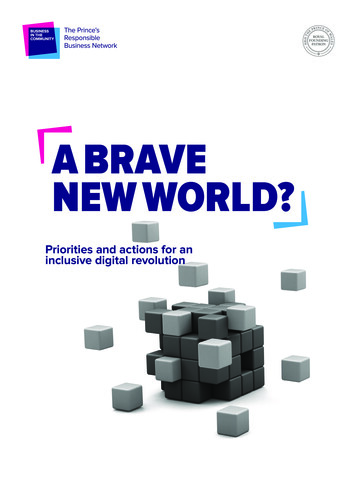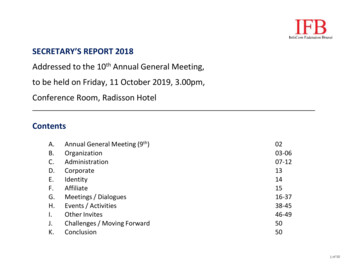
Transcription
A BRAVENEW WORLD?Priorities and actions for aninclusive digital revolution
About This DocumentThis document was originally published in 2017, hence it uses our old branding. Despite its age, thedocument contains relevant and useful information. However, some specific links, case studies andstatistics may be out of date.
A BraveNew World?Priorities and actions for aninclusive digital revolutionApril 2017In partnership with:Supported by:
Priorities for responsible businessin a digital ageBusiness Priority 1Protect, support andempower customersSimplify data practicesMake data sharing and privacy clear and visible from the start.Be inclusiveBuild digital access, capability and confidence to allow all to benefit fromthe digital economy.A Brave New World? Priorities and actions for an inclusive digital revolutionEnable better choicesDevelop solutions that help people to make more informed decisions on their health,education and finances.Business Priority 2Embrace the changingnature of workPrepare employeesProvide digital skills and lifelong learning to create an adaptable workforce.Anticipate automationCreate new roles, where technology complements humans, and support communitiesto manage the transition.Extend employer responsibilityProvide security, job protection and benefits for the growing ‘gig’ economy workforce.Business Priority 3Deliver innovativeproducts and servicesthat serve societyDesign with purposeEnsure technology reflects human values and corrects for unconscious bias.Promote sustainable consumptionTransition to new business models that cut waste and increase asset productivity.Partner to solveWork cross-industry to design and scale solutions that will benefit society.Business Priority 4Drive a transparent,inclusive and productivevalue chainEmpower suppliersProvide digital solutions and training to achieve minimum social and environmentalstandards across the value chain.Click greenMinimise the environmental impact of operations, committing to 100% renewableenergy and zero e-waste.Track, trace and resolveUse digital technology to address corruption, exploitation and environmental harm.To access our toolkit, including company examples that demonstrate each action, please go towww.bitc.org.uk/digitalrb or #DigitalRB. Also available is a PDF of the business priorities andactions, the ‘A Brave New World?’ report and infographic.
BUSINESSPRIORITY1Protect, support andempower customers echnology can be used to help customers makeTbetter decisions. The first step is to educate on digitalsafety, so that people understand the T&Cs they aresigning up to. Technology is a great enabler, but weneed to ensure that no one gets left behind.Ashok Vaswani, Chief Executive Officer, Barclays UKSimplify datapracticesMake data sharing and privacy clear and visible from the start Sedicii has developed a technology designed to make customers and businessessafer online. The ‘Zero Knowledge Proof Protocol’ stops the transmission and storageof user data during the authentication process, therefore reducing identity theft. Nine in ten internet users in the UK and the US would avoid doing business withcompanies that do not protect their privacy.1Be inclusiveBuild digital access, capability and confidence to allow all to benefit fromthe digital economy Barclays’ ‘Digital Eagles’ are 16,000 specially trained employees who help improvepeople’s digital skills and confidence by hosting free sessions, including how to staysafe online. The Eagles also host ‘Code Playground’ taster sessions for young childrenand their families. In Great Britain, 11% of households do not have internet access, while 16% of adultsdo not have the required basic digital skills to buy goods or services from a website.2Enable betterchoicesDevelop solutions that help people to make more informed decisions ontheir health, education and finances Citymapper is a smartphone app that provides users with a complete view of how totravel to their destination. The app uses transport data released by the Greater LondonAuthority and has been well received, with an estimated 50% of iPhones registered inLondon having downloaded it.3 Using open data to generate new and sustainable solutions to key social challengesreturns 5–10 times more value to the economy than the investment cost.41. TRUSTe, A Booming Market for Mobile Commerce Where Trust is Essential, 2013.2. ONS, Statistical bulletin: Internet access – households and individuals, 2016; Go ON UK, Basic Digital Skills UK Report, 2015.3. UK Digital Strategy, Department for Culture, Media and Sport, 1st March 2017.4. Open Data Institute, Investment in Open Data Challenge Series could see 5 to 10-fold return to UK economy over 3 years, 2015.April 2017
BUSINESSPRIORITY2Embrace the changingnature of work usiness needs to step up in addressing jobBinstability driven by the digital revolution, includinganticipating the types of jobs that will emerge as rolesare automated and providing the opportunity for skillsdevelopment and lifelong learning.Julian David, Chief Executive Officer, techUKPrepareemployeesProvide digital skills and lifelong learning to create an adaptable workforce Microsoft has launched a programme to provide free digital literacy training in the UK.Specific initiatives include ‘Cloud Skills’, which will train 500,000 people in advancedcloud technology skills by 2020, along with a scheme to upskill 30,000 civil servantsin a range of digital technologies.1 The digital skills gap is costing the UK economy an estimated 63 billion a year in lostadditional GDP. reate new roles, where technology complements humans, and supportcommunities to manage the transition irbus and Accenture have introduced smart glasses to the A330 aircraft manufacturingAprocess, combining augmented reality and 3D viewing to transform the efficiency andsafety of factory workers. The error rate has reduced to zero and workforce productivityhas increased by 500%. An estimated 15 million UK jobs are at risk from automation by 2035.3Provide security, job protection and benefits for the growing‘gig’ economy workforce allpay, the online payments company, is committed to paying all employees, includingself-employed and temporary staff, a living wage. The first employer in Herefordshire(one of the lowest paid counties) to make this commitment, allpay has increasedengagement and access to talent. People who do irregular work for a decade suffer an average cognitive decline of6.5 years compared with those who have regular hours.41. UK Digital Strategy, Department for Culture, Media and Sport, 1st March 2017.2. House of Commons, Digital Skills Crisis, 2016.3. Haldane, Labour’s Share, 2015.4. BMJ, Chronic effects of shift work on cognition: findings from the VISAT longitudinal study, 2014.April 2017
BUSINESSPRIORITY3Deliver innovative productsand services that serve society he biggest challenge for smaller businesses is how theyTcan make an impact. Partnering with companies acrossdifferent industries to trial and scale technology givespotential to solve much bigger social and environmentalissues than going alone.Eleanor Bradley, Chief Operating Officer, NominetDesign withpurposeEnsure technology reflects human values and corrects for unconscious bias Mozilla is committed to ensuring the internet works for all. This includes strong privacyand security, but also the promotion of openness, interoperability and transparency.All Mozilla’s software is open source, enabling organisations to access code and useit to develop their own products. PromotesustainableconsumptionIn 2016, Google returned six times more high-income job ads to men than to women.1Transition to new business models that cut waste and increaseasset productivity Peerby is a world-leading sharing platform which allows their 250,000 users to rentand borrow 800,000 worth of products on the site. Its members save an averageof 80 when they borrow or rent and owners make up to 400 per month renting outtheir products. Companies that transition to circular economy business models could together createan estimated 3.5 trillion value by 2030.2Partnerto solveWork cross-industry to design and scale solutions that will benefit society UbiGo is a single app that provides access to public transit, car sharing, taxis andbicycles. Users receive a single invoice for all services and receive discounts whenthey use sustainable modes. AB Volvo and the Viktoria Institute collaborated to buildthe range of services. 1.6 billion people will have access to e-health by 2030, generating 165 billion insales for the health sector, as well as 50 billion for the IT sector. 31. FTI, Tech Trends Report, 2017.2. Accenture Strategy, Waste to Wealth, 2015.3. GeSI and Accenture Strategy, SMARTer 2030, 2015.April 2017
BUSINESSPRIORITY4Drive a transparent, inclusiveand productive value chain igital technology provides us with the opportunity toDbuild stakeholder trust by enhancing the transparencyof how we do business. With better understandingof the impact of operations, it’s possible to optimiseexisting systems and reduce resource intensity.Peter Simpson, Chief Executive Officer, Anglian WaterEmpowersuppliersProvide digital solutions and training to achieve minimum social andenvironmental standards across the value chain Unilever’s ‘Marcatus Mobile Education Platform (MMEP)’ is a collaboration betweenUnilever, Oxfam and Ford Foundation to train smallholder farmers in rural areas.63% have adopted the group video screenings, achieving increases of 20% inaverage yields and 24% in net income. Smart agriculture can increase crop yields by 30% on average, creating globaladditional farm revenues of 1.5 trillion by 2030.1Click greenMinimise the environmental impact of operations, committing to 100%renewable energy and zero e-waste Renault operates a circular supply chain, with its products and componentsre-manufactured, repaired or refurbished at their end-of-life, enabled by IT toolsthat keep track of products. Renault has reduced energy use by 80%, use 88%less water and 92% less chemical products. IT has the potential to enable a 20% reduction in global carbon emissions by 2030.2Track, traceand resolveUse digital technology to address corruption, exploitation andenvironmental harm Blockverify is a London-based start-up that uses technology to track, record,and verify products in a way that is permanently logged in the blockchain andcannot be counterfeited or compromised. Blockverify has been piloting solutionswith pharmaceutical and beauty companies. 63% of consumers refuse to buy products and services from companies they donot trust.31. GeSI and Accenture Strategy, SMARTer 2030, 2015.2. GeSI and Accenture Strategy, SMARTer 2030, 2015.3. Accenture: Ethical Supply Chains, 2016.April 2017
AcknowledgementsWith thanks to our corporate partners, Barclays and Fujitsu, forsupporting our programme of work to create an inclusive digitalrevolution. Thanks also to Catherine Phillips and Paul Buchanan,BITC, Gemma Baker, Accenture Strategy, and Tim Cooper, nowDentsu Aegis, for the development and management of this work.BITC would like to acknowledge and extend its sincere gratitudeto a broad community of contributors, through their participationin interviews, roundtables and Connected Business visits.Thanks also to McCann for designing and producing this folderand its contents as part of their support for BITC.For more information about this programme please contact:Stephen FarrantExecutive DirectorBusiness in the Communitystephen.farrant@bitc.org.ukJustin KeebleManaging DirectorAccenture Strategyjustin.keeble@accenture.comAdrian Joseph, Partner, Data, Analytics & Artificial Intelligence, EYLucy Parker, Partner, BrunswickAndy Briggs, Chief Executive Officer UK Insurance, AvivaMark Parker, Chief Operating Officer, Virgin MoneyAndy Lawson, Senior Vice President North Europe, SalesforceMark Ridley, Chief Executive Officer, SavillsBarry Whyte, Chief Operating Officer, DecodedMatt Hammerstein, Head of Client and Customer Experience,Personal and Corporate Banking, BarclaysCharlotte Hogg, former Deputy Governor, Bank of EnglandDominic Vergine, Head of Sustainability and Corporate Responsibility,ARMEleanor Bradley, Chief Operating Officer, NominetElizabeth Fagan, Chief Executive Officer, BootsEstelle Brachlianoff, Chief Executive Officer, VeoliaGlenn Exton, Director of Digital Transformation, Scottish EnterpriseJayne-Anne Gadhia, Chief Executive Officer, Virgin MoneyJulian David, Chief Executive Officer, techUKKeith Weed, Chief Marketing and Communications Officer, UnileverAlex LubarChief Executive OfficerMcCann LondonAshok VaswaniChief Executive OfficerBarclays UKLucy DimesChief Executive OfficerFujitsu UK & IrelandMike Still, Managing Director, UK & Ireland, Corporate Business,Marsh LtdPaul Russell, Director for Technical Services and Defence, CarillionPeter Simpson, Chief Executive Officer, Anglian WaterSteve Holliday, former Chief Executive Officer, National GridTim Page, Senior Policy Officer, TUCVivian Hunt, Managing Partner, McKinsey UK & IrelandYogesh Chauhan, Director Corporate Sustainability,Tata Consultancy ServicesOlly BenzecryManaging DirectorAccenture UK & IrelandAmanda MacKenzieChief Executive OfficerBusiness in the CommunityAntony JenkinsFounder and Executive Chair10x Future Technologies Ltdwww.bitc.org.ukIan Cheshire, Chairman, DebenhamsMike Barry, Head of Sustainable Business (Plan A), M&S
Business in the Community137 Shepherdess WalkLondon N1 7RQT: 44 (0)20 7566 8650E: info@bitc.org.ukwww.bitc.org.ukon 100% recycled paper
1. GeSI and Accenture Strategy, SMARTer 2030, 2015. 2. GeSI and Accenture Strategy, SMARTer 2030, 2015. 3. Accenture: Ethical Supply Chains, 2016. Provide digital solutions and training to achieve minimum social and environmental standards across the value chain Unilever's 'Marcatus Mobile Education Platform (MMEP)' is a collaboration .
